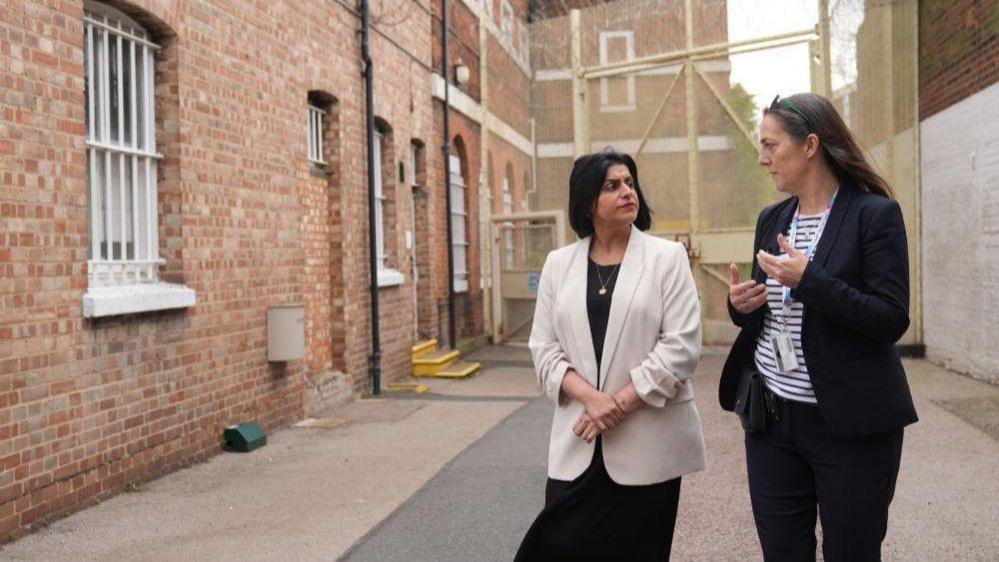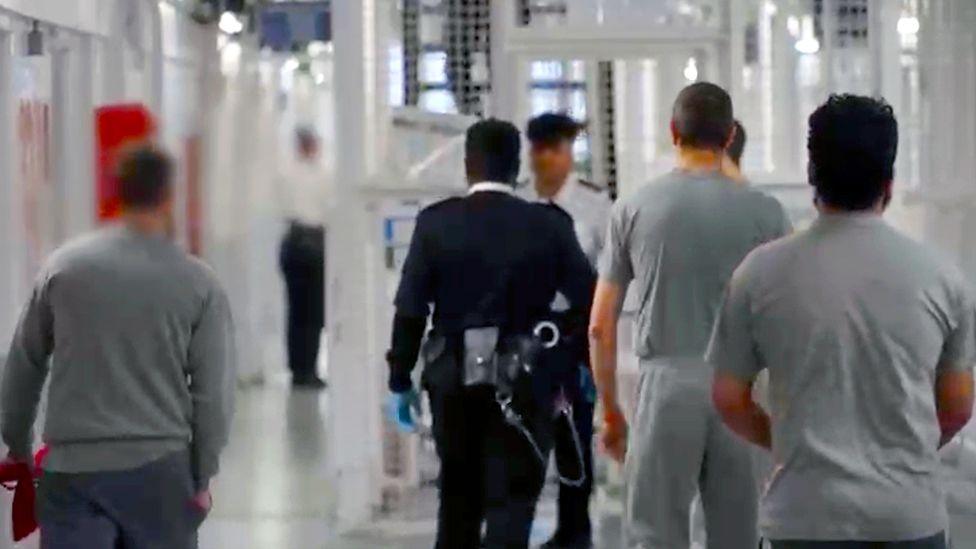1.2% of prison places in England and Wales free
Starmer 'truly shocked' by state of the prison system
- Published
The prison population in England and Wales has reached a record high, just days before the government's temporary early release scheme comes into force.
According to figures released by the Ministry of Justice (MoJ) on Friday, the number of inmates has risen by 1,159 since 2 August, the week when the UK riots began, and now stands at 88,521, the highest level on record.
Prime Minister Keir Starmer told the BBC he was "shocked" at the state of the prison system when asked about a BBC report from inside HMP Pentonville in north London.
"We have to release people early because otherwise we'll have an absolute crisis in our prisons," he said.
As of Friday, there were only 1,098 places left in the prison system in England and Wales - 1.2% of available space.
The government's temporary early release scheme will see about 3,000 prisoners in England and Wales released early from jail on 10 September.
Sir Keir said he did not want to be in a position of releasing people who should be in prison, but said the situation was at "crisis point".
The policy will not apply to those convicted of sex offences, terrorism, domestic abuse and some violent offences.
The prime minister said risk assessments would ensure high-risk prisoners would not be released, with thresholds for risk "bearing in mind the victims".
As part of this scheme, HMP Pentonville is releasing 16 people next week. At the time of the BBC's visit, the jail was close to capacity and has just nine beds free.
Built in 1842, the men's prison was originally designed to hold 520 people in single cells. Now, with two prisoners per cell, it has an operational capacity of 1,205.
The prime minister blamed the past government for not building enough prisons, which he pledged to do. He admitted it was "very difficult" to find prison places during the disorder in England and northern Ireland in late July and early August, which has so far resulted in 863 charges against rioters.
Home Office minister Dame Angela Eagle said on Friday that the MoJ was "considering anything" to "alleviate the problem" of overcrowding.
Speaking to broadcasters, Dame Angela said: "The last government closed loads of prison places and didn't replace any of them.
"What we cannot have is people who are convicted of perhaps violent or serious crimes not being able to be in jail."
Former chief inspector of prisons Nick Hardwick told the BBC's Today programme the early release policy will "remove the immediate pressure".
"I don’t think the government had any alternative in the short-term other than to do these releases," he said.
"But it’s a bit like squeezing a balloon - you release the pressure in one place but the bulge goes somewhere else - and the real problem now is, first of all, some of those released will re-offend for certain, and some of those released, a lot of those released, I fear will end up homeless because there simply isn’t the accommodation for them."
Following reports that ministers were considering renting jail cells outside of the UK to ease the overcrowding problem, Downing Street said on Friday that it had made "no plans or announcements" regarding sending prisoners to serve their sentences in Estonia.
The idea was reportedly raised by the Estonian government with Justice Secretary Shabana Mahmood when she met her counterpart, Liisa Pakosta, in Lithuania earlier this week.
However, a UK government spokeswoman said: "On those reports specifically, I would point out that this was the policy of the former government and that this government has made no such plans or announcements with regard to Estonia."
The government declined to comment on any private conversations between Ms Mahmood and Ms Pakosta at a recent Council of Europe meeting they both attended.
It said it would be publishing a 10-year strategy in the autumn to set out "how we will ensure that we always have the places we need to keep dangerous offenders behind bars".
In July, Ms Mahmood announced plans to cut the proportion of sentences inmates must serve behind bars from 50% to 40%.
She said overcrowding had pushed jails to the "point of collapse".
Related topics
- Published6 September 2024

- Published5 September 2024
